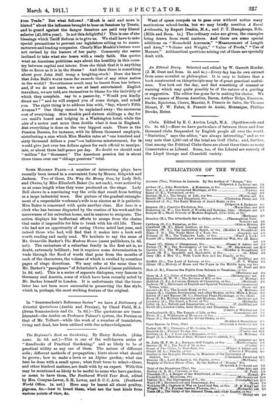SO3D0 MODERN PLAY8.—A number of interesting plays have recently been
issued in a convenient form by Messrs. Sidgwick and Jackson. Two of these, The Way the Honey Goes, by Lady Bell, and Chains, by Miss Elizabeth Baker (1s. net each), were noticed by us at some length when they were produced on the stage. Lady Bell shows in a convincing way the evils that result from betting in a large industrial town. Her picture of the gradual entangle- ment of a respectable workman's wife is as sincere as it is pathetic. Miss Baker is concerned with quite another class. Her hero is a clerk who has become disgusted by the routine of his work and the narrowness of his suburban home, and is anxious to emigrate. The action displays his ineffectual efforts to escape from the chains that make it impossible for him to break with his old life. Those who had not an opportunity of seeing Chains acted last year, and indeed those who had, will find that it makes into a book well worth reading and easily read. We hesitate to say the same of Mr. Granville Barker's The Madras House (same publishers, is. 6d. net). The caricature of a suburban family in the first act is, no -doubt, extremely brilliant ; but it requires some determination to wade through the flood of words that pour from the months of each of the characters, the volume of which is swelled by countless pages of stage directions. We may refer at the same time to Mr. Barker's "paraphrase" of Schnitzler's Anatol (same publishers, is. 6d. net). This is a series of separate dialogues, very famous in Germany and Austria, some of which have been recently acted by Mr. Barker himself in London. It is unfortunate that the trans- lator has not been more successful in preserving the fine style, which is, perhaps, the most striking feature of the original.










































 Previous page
Previous page